I hope you all love summer as much as I do. I am a little like the kids. I can’t wait to get outdoors, run with friends, bask in the sun, and get my hands in the dirt. Summer sights, smells, and experiences are plentiful and oh so nurturing. It’s the time of year when we all disperse into the great outdoors! Let’s go!
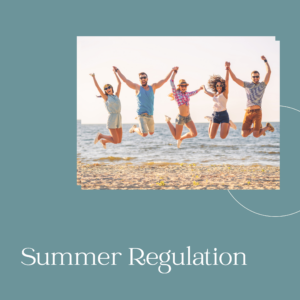
Summer can offer many moments for self-care and self-regulation. But why do we need self-care? And what does it mean to self-regulate?
Can you remember a moment when you were driving down the road and someone pulled out in front of you, cut you off, or did something risky and almost caused an accident. You got through the moment safely but now your heart is working hard. Your hands are sweaty and gripping the wheel. Your gut feels like it is knots, and your head is swirling. So you pull over for a few moments, take a deep breath or two, and feel a few moments of gratitude that all is well. Maybe you get out and walk or purchase something to drink.
In this scenario you have practiced both self-care and self-regulation. Self-care is the act of taking the breath, feeling gratitude, and walking or getting a drink. Self-regulation is the ability to bring yourself back down from the surge of physiological changes back to a place of calm.
Your physiology changes throughout the day to help you meet the demands of every moment as they come. This may mean energizing yourself for a morning run. Quieting yourself to be with a friend. Motivating yourself to do a task you dislike. It is the ability to hold your thoughts and words and listen to someone with a different perspective. Or, holding angry words back when someone frustrates you.
Self-regulation develops. We are not born with the ability to self-regulate. We practice over and over and over again. And, we need many, many experiences to practice this skill. And summer is a wonderful time to exercise your nervous system. Summer activities are a great way to boost your ability to self-regulate, take time for self-care and stretch your tolerance for challenges to come.
Find your way to self-care and self-regulate this summer.
Here are 6 ways to practice summer self-care and summer self-regulation:
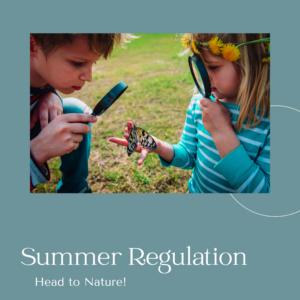
1. Be in nature
Did you know that birds sing when they feel safe? We hear the birds sing, and we feel safe. The bird’s nervous system is talking to ours, and ours is responding.
A 2020 study showed that kindergarteners who spent more time outdoors in green spaces improved their ability to self-regulate compared to a control group who did not. Additional research suggests that when people in large cities can look out their windows at green spaces, violence goes down, aggression goes down, and mental wellbeing improves. Their cortisol levels go down. Breath that in. Nature calms us down.
Whether you look out your window, sit on your deck and listen to birds, take a hike, or go backwoods camping, your nervous system will thank you. Nature grabs your senses, all of them! Nature captures your attention, calms your mind, reboots your energy, and offers moments of reflection. The next time you find yourself in the great outdoors, take a moment to notice what you smell, the sounds you hear, what you feel, touch, and see. Take it in and offer gratitude.
2. Be grateful
A few moments of gratitude has big payoffs for your mental health. Whether you journal, pray, meditate, or share your thanks with a friend, your body likes gratitude. Take a few moments in your day to think of the people, places, and things that bring you joy or impact you in some way. Remind yourself later and this small thought will grow to a larger memory. As you continue to reflect you will feel the transformation in your body towards a more positive outlook on life.
It turns out that our brains need this little boost. The brain has a bias towards negativity to help you avoid pain or harm. You must purposely remind your brain and self that all is well. In fact, there are moments where life is grand.
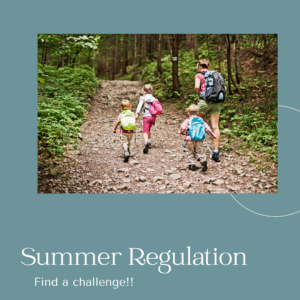
3. Find a challenge
Believe it or not, our brain also likes a challenge. It’s through challenge that the opportunities for changes in learning and memory open wider. Combine summer and challenge and you have fun learning! Think of the self directed learning that takes place with kids every summer. Their bodies grow and their abilities also grow. Summer begs kids to learn to swim, ride a bike, learn to skateboard, run, or fly a kite. When you learn you have to regulate your thoughts, emotions, and actions. This is self-regulation practice in real time. And it’s fun. What summer challenges interest you?
4. Be with people
Find your people and do things together. Play ball, sit on the beach. Have a cookout or sit around a fire. Find people that interest you and spark curiosity in a topic. Listen to people with a different perspective or those who challenge you and allow yourself to wonder where your perspectives meet.
In these times together we laugh, dance, celebrate, hug, learn, share, and support each other. In the process you are nurturing your nervous system, giving it the experience of safety and relaxation, and creating happy chemicals that permeate your being and lift you up.
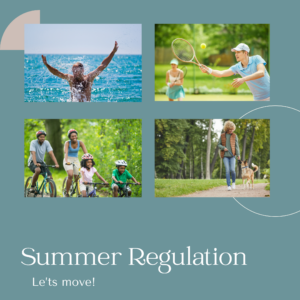
5. Be active
Moving can also make you feel happy and regulated. When you move those muscles, you strengthen them, you teach them how to coordinate together, you send oxygen and blood flow throughout your body, reduce cortisol levels and balance your blood sugar levels.
When you are active you feel better. Your muscles are busy squishing out chemicals and hormones that improve your mood, body function, and overall well being. These neurochemicals also prime your brain for learning. Being active is a powerful summer self-care practice.
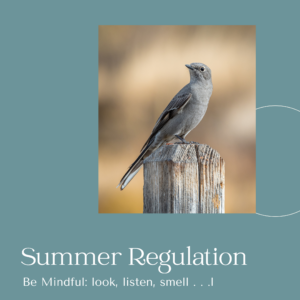
6. Be Mindful
Summer days provide so many lovely moments to be mindful. According to research, being present can calm your nervous system, improve your attention, and boost your wellbeing. In the end we become better social creatures.
So many summer experiences engage the senses, making it easier to be mindful and resist distractions. These moments nurture every part of who you are and are an important part of self-care.
Think of the fresh morning air. Go outside and take it in.
Watch a sunset
Take your dog for a quiet morning walk.
Listen to the birds.
Float in the pool with your kids.
Savor that ice cream cone.
Learn to boat, to fish, to rock climb, ride your bike, play pickleball outdoors . . .
Whatever activity you choose for self-care requires you to be mindful to perform.
The newer it is for you, the more mindful you must be.
Where will you find your self-care this summer? What new experiences will you explore? What favorites will you revisit? Who do you want to include in your self-care moments?
Most of all, have fun. When we laugh, giggle, smile, and feel good, our body responds and finds healthy ways to self regulate. Happy summer!
For more on helping children regulate read these:
Ten Tips to Help Children Regulate and Improve Their Behavior
Bad Behavior Is A Messenger: 10 Ways To Help Children Regulate
References:
Barton, J., & Rogerson, M. (2017). The importance of greenspace for mental health. British Journal of Psychiology, 14(4), 79-81. doi: 10:1192/s205647000002051
Harvard Health Publishing. (2021, August 14). Giving thanks can make you happier.
https://www.health.harvard.edu/healthbeat/giving-thanks-can-make-you-happier
Harvard Health Publishing. (2021, May 1). Put your brain to the challenge: New experiences stimulate pathways that improve memory. https://www.health.harvard.edu/mind-and-mood/put-your-brain-to-the-challenge
Matei, D., Trofin, D., Iordan, D. A., Onu, I., Condurache, I, Ionite, C., Buculei, I. (1989). The endocannabinoid system and physical exercise. International Journal of Molecular Science, 24(3). doi: 10.3390/ijms24031989
Taylor, A. F. & Butts-Wilmsmeyer, C. (2020). Self-regulation in kindergarten related to frequency of green schoolyard use. Journal of Environmental Psychology, 70.

